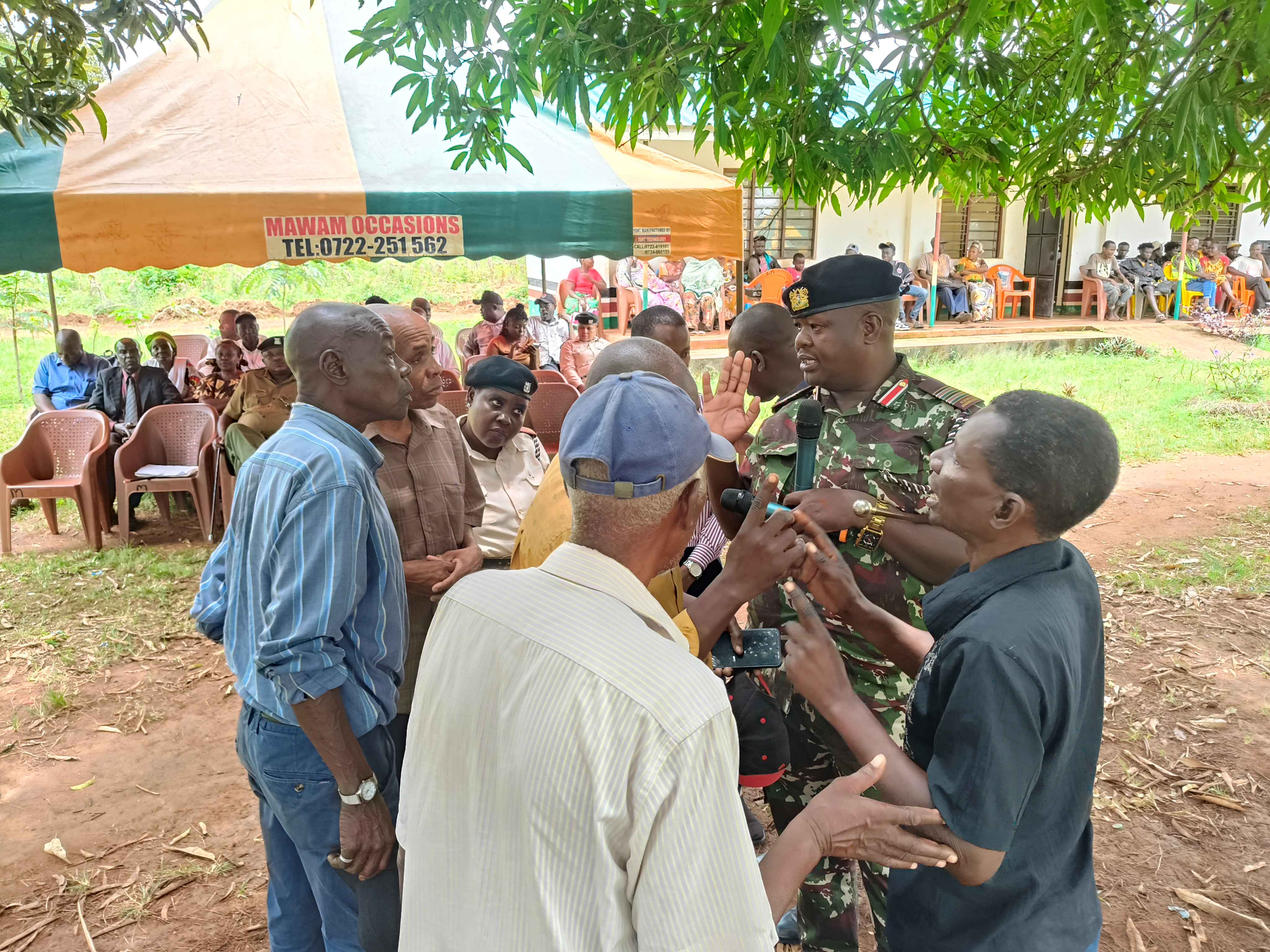
 Rabai deputy
county
commissioner
Joseph Lenkarie
tries to calm a
crowd down
/HANDOUT
Rabai deputy
county
commissioner
Joseph Lenkarie
tries to calm a
crowd down
/HANDOUT
Despite being harassed, arbitrarily arrested, extorted, shot or disappeared, majority of victims of police excesses are not likely to report to authorities as public confidence in criminal justice system has severely tanked, survey shows.
The survey by the International Justice Mission (IJM) found that only 14.3 per cent of participants had faith in the criminal justice system.
The criminal justice actors considered in this context include the Independent Police Oversight Authority, the National Police Service, DCI, the Internal Affairs Unit and the Victim Protection Board.
The basement-level public confidence is despite sustained public outreach efforts by the criminal justice entities like the Judiciary and police to win it.
The IJM study assessed the prevalence of police abuse of power between March 2022 and March 2024.
A total of 5,700 participants were engaged through a quantitative household survey covering nine counties, and 17 focused group discussion were conducted across these counties.
The study was conducted in Garissa, Kakamega, Kisumu, Machakos, Mombasa, Nairobi, Nakuru and Uasin Gishu counties, representing the former provincial regions.
Focused group discussions with participants from the sampled counties facilitated exploration into their experiences around police abuse of power, including some of the factors that predispose citizens to police misconduct.
The report says there is “a severe lack of confidence in the effectiveness of the criminal justice system in Kenya to protect vulnerable people and deter police officers from abusing their power”.
Stakeholder confidence on the overall effectiveness of the justice system measured perceptions or beliefs held by influential stakeholders on coordination, respect for rule of law and public support for various criminal justice system actors to protect vulnerable people from police abuse of power.
“The data revealed that only 14.3 per cent of the stakeholders are confident in the overall effectiveness of the justice system. The overall outlook reflects a general lack of confidence in the efficiency of CJS operations towards tacking police abuse of power in the country,” it reads.
It says only two per cent of the stakeholders indicated they were confident in the overall level of efficiency of the National Police Service and the DCI, 8.2 per cent confident in the overall level of efficiency of Ipoa and Victim Protection Board.
And even in the institution that scored favourable confidence levels among the public, the scores were equally poor, showing a systemic problem.
For example, the report says, the stakeholders were most confident in the overall level of efficiency of the ODPP (16.3 per cent) and courts (10.2 per cent).
Notably, the average level of confidence was significantly low. At only 7.8 per cent of stakeholders engaged were confident in the overall efficiency of criminal justice system institutions.
At the same time, 62.6 per cent of participants who reported being violated or victimised by the police indicated they did not report the incident anywhere, while 37.4 per cent stated they had reported it somewhere.
They cite lack of confidence in the system to either guarantee their safety after reporting or serve them justice at the end of it, and if it did, in an expeditious manner.
“The reasons for not reporting […] were primarily a lack of trust in criminal justice institutions (29.2 per cent) and a lack of awareness about where to report such cases (28.9 per cent),” it says.
Additional factors included the long duration of cases, reported by 18.4 per cent of participants, fear of retaliation was highlighted by 16.4 per cent of participants and perceived ineffectiveness and corruption in the system accounted for 26.2 per cent.
Additionally, 17.3 per cent of participants cited the costs associated with seeking justice as a significant factor.
Further, survey says respondents expressed frustration over systemic failures, where police officers perpetrate violence and hinder victims from seeking justice.
“The process of obtaining necessary documentation, such as the P3 form (which is an essential tool for victims of assault that facilitates legal and medical documentation of injuries sustained) is obstructed, and senior officers protect their juniors, ensuring no accountability,” it says.
“Reporting incidents to oversight bodies like Ipoa often leads to stalled investigations with little to no follow-up. Additionally, there are reports of police dismissing complaints, refusing to issue Occurrence Book (OB) numbers and engaging in intimidation tactics.“
Instant analysis
Widespread police abuse in Kenya persists largely unchecked due to a collapse in public trust. With only 14.3 per cent of people expressing confidence in the justice system, accountability remains elusive.
















